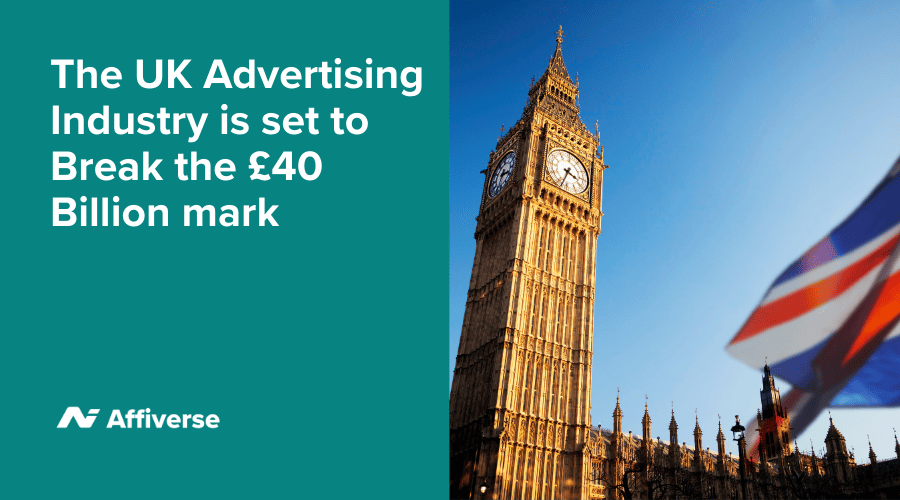The UK Advertising Industry Set to Break £40 Billion

The UK advertising industry is poised to surpass £40 billion in revenue, cementing its status as a leader in Europe. Digital advertising is the primary driver of this growth, accounting for the largest share of ad spend as brands shift their focus to online platforms to connect with increasingly tech-savvy consumers.
This milestone not only reflects the resilience of the UK advertising market but also highlights the growing dominance of digital channels in shaping how brands communicate and engage with their audiences.
The Growth of Digital Advertising
Digital advertising has transformed the advertising landscape in the UK. From search ads and display banners to social media campaigns and programmatic buying, the digital sphere offers an unparalleled level of precision, scale, and measurability.
Several factors are fuelling the growth of digital advertising in the UK:
- Social Media Dominance: Platforms like Facebook, Instagram, TikTok, and LinkedIn have become essential tools for brands looking to target specific demographics. With billions of daily active users, these platforms are where audiences spend the bulk of their time.
- Streaming Services: With more people cutting the cord and shifting to digital streaming platforms like YouTube, Netflix, and Spotify, advertisers have access to fresh opportunities for targeted campaigns through video and audio content.
- Search and E-commerce Integration: Google and Amazon remain major players, with ad formats tailored to consumer search behaviour and shopping intent. Paid search and sponsored product listings are now critical to driving online sales.
Why Digital Advertising Leads the Way
Digital’s dominance is no coincidence. It offers significant advantages over traditional media:
- Data-Driven Insights: Brands can target their ideal audiences with pinpoint accuracy, using behavioural, demographic, and geographic data to optimise campaigns.
- Cost-Effectiveness: Digital campaigns allow advertisers to reach millions at a fraction of the cost of traditional TV or print ads, making them accessible for businesses of all sizes.
- Interactivity: Unlike traditional formats, digital ads can encourage immediate interaction, whether through likes, comments, or direct purchases.
- Real-Time Optimisation: Digital platforms allow campaigns to be adjusted on the fly, enabling marketers to improve performance and maximise returns.
Challenges in the Digital Space
While the growth of digital advertising is a cause for celebration, it’s not without its challenges. Rising ad costs, increasing competition, and stricter data privacy regulations are forcing brands to adapt.
- Privacy Concerns: Regulations like GDPR and the phasing out of third-party cookies are changing how brands collect and use data. This shift requires companies to invest in first-party data strategies and build direct relationships with their audiences.
- Ad Fatigue: As users are exposed to more ads across platforms, standing out in a crowded market has become increasingly difficult. Creativity and authenticity are now critical to capturing attention.
- Small Business Struggles: The high costs of advertising on platforms like Google and Facebook can make it harder for smaller businesses to compete with larger players who dominate these spaces.
The Role of Digital in UK Advertising Leadership
The UK’s leadership in advertising is closely tied to its investment in digital. Unlike other European markets, where traditional media still holds a significant share, UK brands have embraced digital channels as their primary way to reach consumers.
This is particularly evident in sectors like retail, where e-commerce and digital-first strategies have reshaped consumer expectations. British advertisers have also been quick to adopt new formats, such as shoppable social media ads and influencer collaborations, to drive engagement and sales.
What the Future Holds
As the UK advertising industry crosses the £40 billion mark, its trajectory will likely continue upward, driven by innovation and the continued rise of digital channels. However, success will require agility and the willingness to adapt to changing consumer behaviours and regulatory landscapes.
Brands and marketers must invest in creative storytelling, embrace emerging technologies like artificial intelligence, and prioritise trust and transparency in their campaigns. With digital at the forefront, the UK’s advertising industry is well-positioned to lead the way in Europe and beyond, setting new benchmarks for creativity and effectiveness.
The £40 billion milestone is not just a testament to the industry’s growth but also a glimpse into the future of advertising – a future shaped by the UK’s ability to innovate, adapt, and embrace the possibilities of the digital world.






